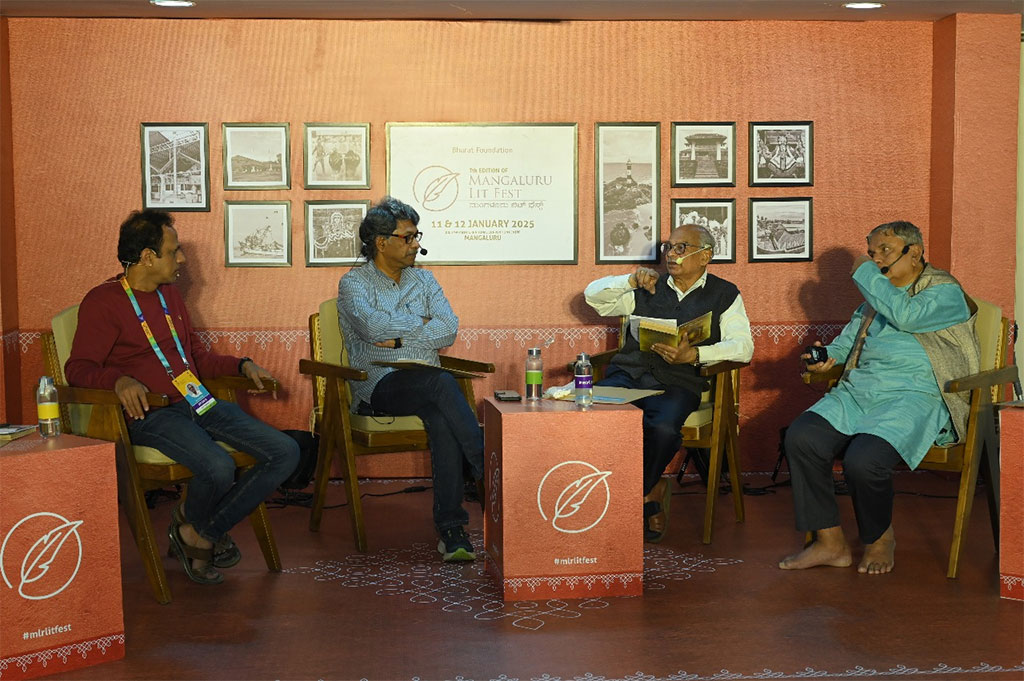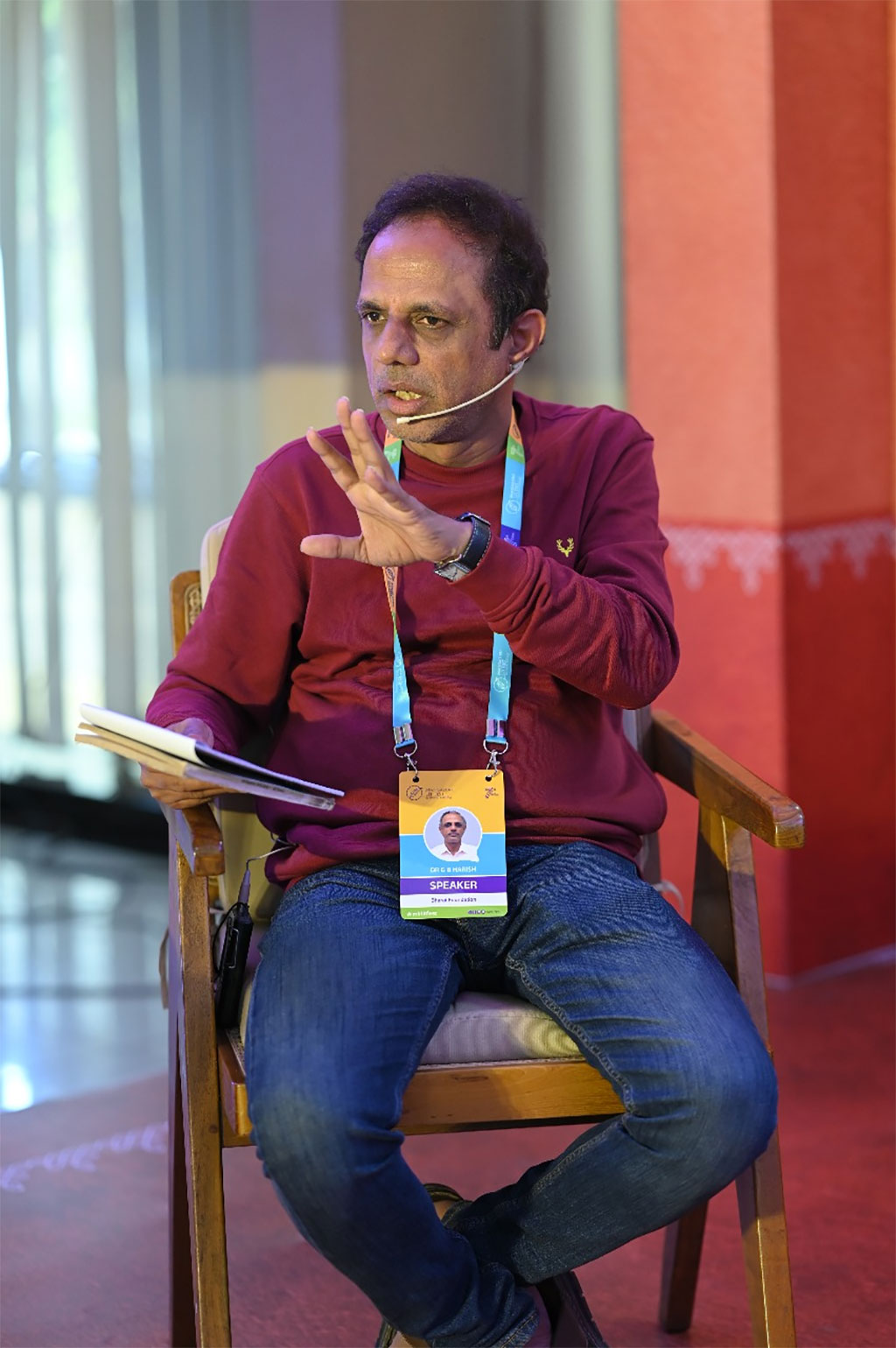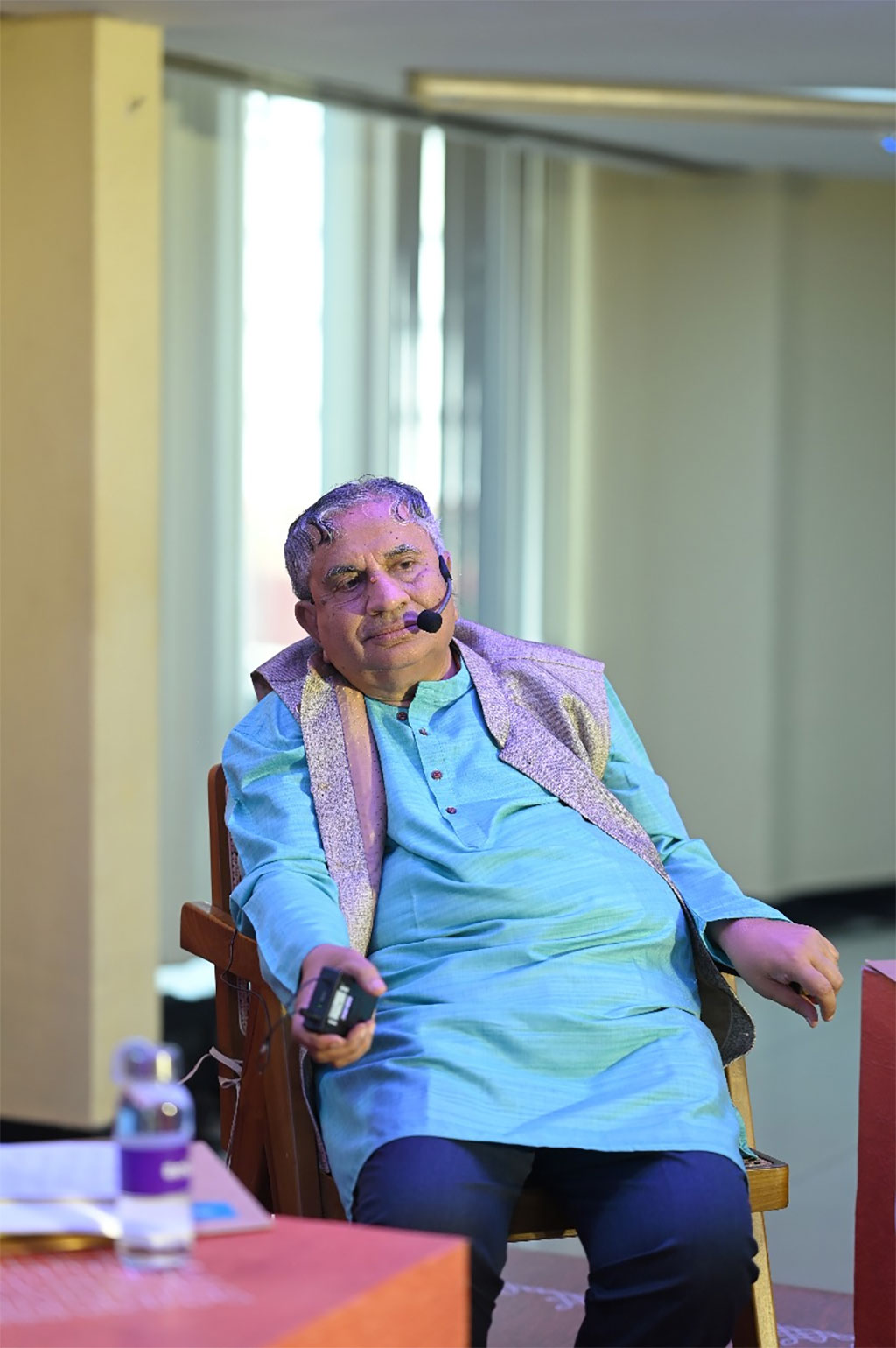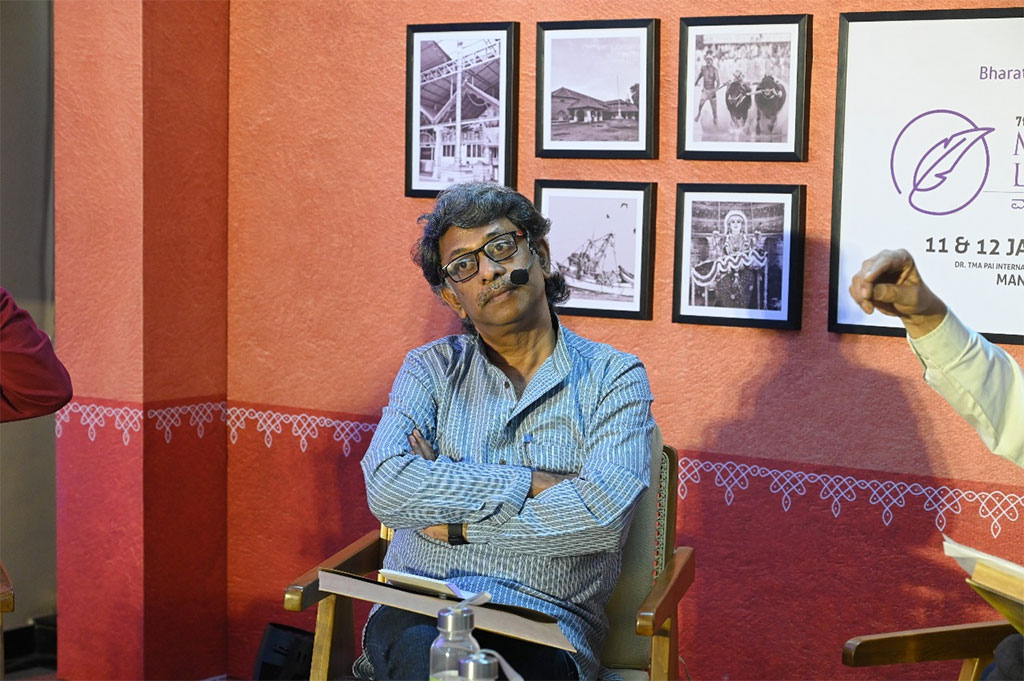Audi 2 – Session 1 : 10.45 am
ಡಾ. ಜಿ. ಬಿ. ಹರೀಶ, ಡಾ. ಎನ್. ಎಸ್. ಗುಂಡೂರ, ಡಾ. ಶ್ಯಾಮಸುಂದರ ಬಿದರಕುಂದಿ ಮತ್ತು ಡಾ. ಕಾಖಂಡಕಿ ಹೆಚ್. ವಿ.
ಚರ್ಚಾ ಫಲಕದಲ್ಲಿ ಲೇಖಕರಾದ ಡಾ. ಜಿ. ಬಿ. ಹರೀಶ್, ಜೈನ ಮತ್ತು ಪ್ರಾಕೃತ ಭಾಷಾ ಸಂಪ್ರದಾಯಗಳ ಕುರಿತಾದ ಸಂಶೋಧನೆಗಾಗಿ ಮೈಸೂರು ವಿಶ್ವವಿದ್ಯಾಲಯದಿಂದ ಡಾಕ್ಟರೇಟ್ ಪದವಿ ಪಡೆದವರು, ತುಮಕೂರು ವಿಶ್ವವಿದ್ಯಾಲಯದ ಪ್ರಾಧ್ಯಾಪಕರಾದ ಡಾ. ಎನ್.ಎಸ್. ಗುಂಡೂರ್, ವಿಭಜನಾ ಕಾದಂಬರಿಗಳ ಕುರಿತಾದ ಸಂಶೋಧನೆಗಾಗಿ 2004 ರಲ್ಲಿ ಕರ್ನಾಟಕ ವಿಶ್ವವಿದ್ಯಾಲಯದಿಂದ ಡಾಕ್ಟರೇಟ್ ಪಡೆದವರು ಮತ್ತು ಗದಗಿನ ಎ.ಎಸ್.ಎಸ್. ವಾಣಿಜ್ಯ ಕಾಲೇಜಿನ ನಿವೃತ್ತ ಕನ್ನಡ ಪ್ರಾಧ್ಯಾಪಕರಾದ ಡಾ. ಶ್ಯಾಮಸುಂದರ್ ಬಿದರಕುಂದಿ, ಹಲವಾರು ಪುಸ್ತಕಗಳನ್ನು ಬರೆದವರು ಇದ್ದರು. ಅವರು ಪ್ರಸ್ತುತ ಡಾ. ಡಿ.ಆರ್. ಬೇಂದ್ರೆ ರಾಷ್ಟ್ರೀಯ ಸ್ಮಾರಕ ಟ್ರಸ್ಟ್ನ ಅಧ್ಯಕ್ಷರಾಗಿದ್ದಾರೆ. ಈ ಚರ್ಚೆಯನ್ನು ಡಾ. ಕಾಖಂಡಕಿ ಎಚ್.ವಿ. ಸಂವಾಹಕರಾಗಿ ನಡೆಸಿಕೊಟ್ಟರು.

ಈ ಚರ್ಚೆಯು ಕನ್ನಡ ಸಾಹಿತ್ಯದ ಐತಿಹಾಸಿಕ ಬೆಳವಣಿಗೆ, ಸಾಹಿತ್ಯ ವಿಮರ್ಶೆಯ ಅರ್ಥ ಮತ್ತು ಅವಶ್ಯಕತೆಯ ಕುರಿತು ಸಂಭಾಷಣೆಗೆ ವೇದಿಕೆಯನ್ನು ಒದಗಿಸಿತು. ಕವಿರಾಜಮಾರ್ಗದಿಂದ ಪ್ರಾರಂಭವಾದ ಕನ್ನಡ ವಿಮರ್ಶೆಯು ನಿರಂತರವಾಗಿ ವಿಕಸನಗೊಂಡಿದೆ ಮತ್ತು ಸಮಕಾಲೀನ ಸಾಹಿತ್ಯದಲ್ಲಿಯೂ ಮಹತ್ವದ್ದಾಗಿದೆ ಎಂದು ವಿವರಿಸಲಾಯಿತು. ವಿಚಾರ ಸಂಕಿರಣವು ಡಾ. ಆಮೂರ್ ಅವರ ಕೊಡುಗೆಗಳು, ಸಾಧನೆಗಳು ಮತ್ತು ಕನ್ನಡ ಸಾಹಿತ್ಯದಲ್ಲಿ ಸಾಹಿತ್ಯ ವಿಮರ್ಶೆಯ ಮಹತ್ವವನ್ನು ಎತ್ತಿ ತೋರಿಸಿತು.
ಡಾ. ಶ್ಯಾಮಸುಂದರ್ ಬಿದರಕುಂದಿ ಅವರು ಸಾಹಿತ್ಯವನ್ನು ಅಭ್ಯಾಸ ಮಾಡುವುದು ಬಹಳ ಮುಖ್ಯ ಎಂದು ಒತ್ತಿ ಹೇಳಿದರು. ಇಂಗ್ಲಿಷ್ನಲ್ಲಿನ ಸಾಹಿತ್ಯವು ಮೂಲತಃ ವೈಯಕ್ತಿಕ ಮತ್ತು ಧಾರ್ಮಿಕ ನೀತಿಗಳನ್ನು ಆಧರಿಸಿದೆ ಎಂದು ಅವರು ಸೂಚಿಸಿದರು. ಆದಾಗ್ಯೂ, ಆಧುನಿಕ ಕಾಲದಲ್ಲಿ, ಸಾಹಿತ್ಯವು ಸಮಾಜ, ರಾಷ್ಟ್ರ ಮತ್ತು ಜನರ ಪರಿಸ್ಥಿತಿಗಳನ್ನು ಸುಧಾರಿಸುವ ಗುರಿಯನ್ನು ಹೊಂದಿದೆ. ಈ ಅಭ್ಯಾಸವು ಶಾಲೆಗಳು, ಕಾಲೇಜುಗಳು ಮತ್ತು ವಿಶ್ವವಿದ್ಯಾಲಯಗಳಲ್ಲಿ ಪ್ರಾರಂಭವಾಯಿತು, ಇದು ಸಾಹಿತ್ಯ ವಿಮರ್ಶೆಯಲ್ಲಿ ಹೊಸ ದೃಷ್ಟಿಕೋನಗಳು ಮತ್ತು ದಿಕ್ಕುಗಳಿಗೆ ಕಾರಣವಾಯಿತು. ಅವರು ತಮ್ಮ ಅಭಿಪ್ರಾಯವನ್ನು ವ್ಯಕ್ತಪಡಿಸಿದರು.
ಈ ಬರಹಗಾರರು ಪಾಶ್ಚಾತ್ಯ ಚಿಂತನೆಯಿಂದ ಪ್ರೇರಿತರಾಗಿದ್ದರೂ ಕನ್ನಡ ಸಾಂಸ್ಕೃತಿಕ ಸಂಪ್ರದಾಯಗಳನ್ನು ಉಳಿಸಿಕೊಂಡು ಹೊಸ ರೀತಿಯ ಸಾಹಿತ್ಯವನ್ನು ಸೃಷ್ಟಿಸಿದರು. ಅವರು ಕನ್ನಡ ಸಾಹಿತ್ಯ ವಿಮರ್ಶೆಯ ಮಹತ್ವವನ್ನು ವಿವರಿಸಿದರು ಮತ್ತು ಸಂಕೀರ್ಣ ಸಾಹಿತ್ಯ ಕೃತಿಗಳು ಸಾಹಿತ್ಯ ವಿಮರ್ಶೆಯನ್ನು ಆಕರ್ಷಿಸುತ್ತವೆ ಎಂದು ಸೇರಿಸಿದರು. ಪಾಶ್ಚಾತ್ಯ ಸಾಹಿತ್ಯದಲ್ಲಿ ಪಠ್ಯ ವಿಶ್ಲೇಷಣೆ ಹೆಚ್ಚಾಗಿದ್ದರೂ ಸಂಶ್ಲೇಷಣೆ ಕಾಣೆಯಾಗಿದೆ. ವೇದಾಂತ ಮತ್ತು ಶಾಸ್ತ್ರಗಳ ವಿದ್ವಾಂಸರಾದ ಕುಮಾರಿಲ ಭಟ್ಟರದು ಅತ್ಯಂತ ತೀಕ್ಷ್ಣ ವಿಮರ್ಶಾತ್ಮಕ ಮನಸ್ಸುಗಳಲ್ಲಿ ಒಂದು ಎಂದು ಅವರು ಸೂಚಿಸಿದರು. ಕನ್ನಡ ಸಾಹಿತ್ಯ ವಿಮರ್ಶೆ ಪ್ರಗತಿಯಾದಂತೆ, ಸಾಹಿತ್ಯ ಮತ್ತು ವಿಮರ್ಶೆಯ ನಡುವಿನ ಸಂಬಂಧವನ್ನು ಅವರು ಚರ್ಚಿಸಿದರು, ಕಾವ್ಯ ಮತ್ತು ವಿಮರ್ಶೆ ಎರಡೂ ಪರಸ್ಪರ ಪುಷ್ಟೀಕರಿಸಿವೆ, ಕನ್ನಡ ಸಾಹಿತ್ಯದ ಪ್ರಗತಿಗೆ ಕೊಡುಗೆ ನೀಡುತ್ತಿವೆ ಎಂದು ಹೇಳಿದರು.
ಡಾ. ಎನ್.ಎಸ್. ಗುಂಡೂರ್ ಅವರು ವಿಮರ್ಶಕರು ಅಳಿವಿನಂಚಿನಲ್ಲಿರುವ ಪ್ರಭೇದ ಎಂದು ಹೇಳಿದರು. ಕನ್ನಡ ಸಾಹಿತ್ಯ ಕ್ಷೇತ್ರವು ನೂರಕ್ಕೂ ಹೆಚ್ಚು ವರ್ಷಗಳ ಸಾಹಿತ್ಯ ವಿಮರ್ಶೆಯ ಇತಿಹಾಸವನ್ನು ಹೊಂದಿದೆ. ಅಮೂರ್ ಅವರು 1976 ರಲ್ಲಿ ವಿಮರ್ಶೆ ಒಂದು ಸಾಹಿತ್ಯ ಪ್ರಕಾರ ಎಂದು ಬರೆದಿದ್ದರು. ವಿಮರ್ಶೆಯಲ್ಲಿಯೂ ನಮ್ಮ ಬರಹಗಾರರನ್ನು ಪಾಶ್ಚಾತ್ಯ ಬರಹಗಾರರಿಗೆ ಹೋಲಿಸಬಾರದು ಏಕೆಂದರೆ ನಾವು ಸಾಂಸ್ಕೃತಿಕವಾಗಿ ಭಿನ್ನರಾಗಿದ್ದೇವೆ ಮತ್ತು ವಿಭಿನ್ನ ಸೂಕ್ಷ್ಮ ಸಂವೇದನೆಗಳನ್ನು ಹೊಂದಿರಬಹುದು. ಆಧುನಿಕ ವಿಮರ್ಶೆಯು ಪಠ್ಯ ವಿಶ್ಲೇಷಣೆಯನ್ನು ಮೀರಿ ಹೋಗಬೇಕು. ಸಾಹಿತ್ಯ ಚರಿತ್ರೆಯನ್ನು ಮರೆಯಬಾರದು. ವಿಮರ್ಶಕನು ಸಾಹಿತ್ಯ ವಿಮರ್ಶೆಯ ಸೃಷ್ಟಿಕರ್ತ. ಅಮೂರ್ ಅವರಿಗೆ ಸಾಹಿತ್ಯ ವಿಮರ್ಶೆಯ ದೃಷ್ಟಿ ಇತ್ತು. ಕೀರ್ತಿನಾಥ ಕುರ್ತಕೋಟಿ ಅವರು ಸಾಹಿತ್ಯ ವಿಮರ್ಶೆಯ ಮಹತ್ವವನ್ನು ಒತ್ತಿ ಹೇಳಿದರು. ವಿಮರ್ಶಕನು ವಿನಯವನ್ನು ಹೊಂದಿರಬೇಕು ಮತ್ತು ಅಹಂ ಇಲ್ಲದಿರಬೇಕು. ವಿಮರ್ಶಕರಾಗಲು ಒಬ್ಬರು ಸಾಹಿತ್ಯ ಪ್ರೇಮಿಯಾಗಿರಬೇಕು.
ಕನ್ನಡ ಸಾಹಿತ್ಯ ವಿಮರ್ಶೆಯ ಕುರಿತ ಶೈಕ್ಷಣಿಕ ಚರ್ಚೆಯು ಆಸಕ್ತಿದಾಯಕ ಪ್ರಶ್ನೋತ್ತರ ಅವಧಿಯೊಂದಿಗೆ ಕೊನೆಗೊಂಡಿತು. ಪ್ರೇಕ್ಷಕರು ಸಕ್ರಿಯವಾಗಿ ಭಾಗವಹಿಸಿ, ಸ್ಪಷ್ಟೀಕರಣಗಳನ್ನು ಕೋರಿದರು ಮತ್ತು ತಮ್ಮ ದೃಷ್ಟಿಕೋನಗಳನ್ನು ಹಂಚಿಕೊಂಡರು, ಇದು ಚರ್ಚೆಯನ್ನು ಮತ್ತಷ್ಟು ಪುಷ್ಟೀಕರಿಸಿತು. ಸಭಿಕರಿಗೆ ಕನ್ನಡ ಸಾಹಿತ್ಯ ವಿಮರ್ಶೆಯ ವಿಕಾಸ ಮತ್ತು ಮಹತ್ವದ ಬಗ್ಗೆ ಆಳವಾದ ಒಳನೋಟಗಳನ್ನು ನೀಡಿದರು.



An Academic Debate on Kannada Literature Criticism: GS Amur – Shatamanada Nenapu
Dr. G. B. Harish, Dr. N.S. Gundur, Dr. Shyamasundara Bidarkundi and Dr. Kakhandaki H.V.
This discussion was conducted by Dr. Kakhandaki H.V. as the moderator. On the discussion panel were Dr. G.B. Harish, a writer, doctorate awardee from Mysore University for his research on the Jain and Prakrit language traditions, Dr. N.S. Gundur, a professor at Tumkur University. Dr. Gundur who received a doctorate from Karnataka University in 2004 for his research on the partition novels and
Dr. Shyamasundar Bidrakundi, a retired Kannada professor from Gadag’s A.S.S. Commerce College, who has authored several books. He is currently the president of the Dr. D. R. Bendre National Memorial Trust.
The discussion provided a platform for a conversation on the historical development of Kannada literature, the meaning and necessity of literary criticism. The seminar highlighted Dr. Amur’s contributions, achievements, and the importance of literary criticism in Kannada literature.
Dr. Shyamasundar Bidarakundi explained that Kannada criticism, which began with Kavirajamarga, has continuously evolved and remains significant in contemporary literature. Practicing literature is very important. He pointed out that the literature in English was originally based on personal and religious ethics. However, in modern times, literature has aimed at improving society, the nation, and the conditions of the people. This practice began in schools, colleges, and universities, leading to new perspectives and directions in literary criticism. He expressed the view that multilingual writers, including those from Mangalore like Govinda Pai, followed these concepts and shaped literature in local languages as well.
Dr. G.B. Harish explained the progress of Kannada literature and its criticism. He identified important figures like Govinda Pai, Bendre, and B.M. Sri as key contributors to shaping Kannada literature. These writers were inspired by Western thought but created a new kind of literature while preserving Kannada cultural traditions. He elaborated on the importance of Kannada literary criticism and added that complex literary works attract literary criticism. In western literature synthesis is missing, though there is much textual analysis. He pointed that one of the sharpest critical minds was that of Kumarila Bhatta, scholar of Vedanta and scriptures. As Kannada literary criticism progressed, he discussed the relationship between literature and criticism, stating that both poetry and criticism have mutually enriched each other, contributing to the advancement of Kannada literature.
Dr. N.S. Gundur stated that the critic is an endangered species. The field of Kannada literature has more than a hundred years of history of literary criticism. Amur had written in 1976 that criticism is a literary genre. Even in criticism let us not compare our writers to Western writers because we are culturally different and may have different sensibilities.. Modern criticism needs to go beyond textual analysis. Let us not forget literary history. The critic is the creator of literary criticism.. Amur had a vision of literary criticism. Kirtinatta Kurtakoti had emphasized on the significance of literary criticism. A critic should have humility and lack ego. To be a critic one must be a lover of literature.
The academic debate on Kannada literature criticism concluded with an engaging question-and-answer session. The audience actively participated, seeking clarifications and sharing their perspectives, which further enriched the discussion. The panelists addressed these queries thoughtfully, leaving the attendees with deeper insights into the evolution and importance of Kannada literary criticism.
